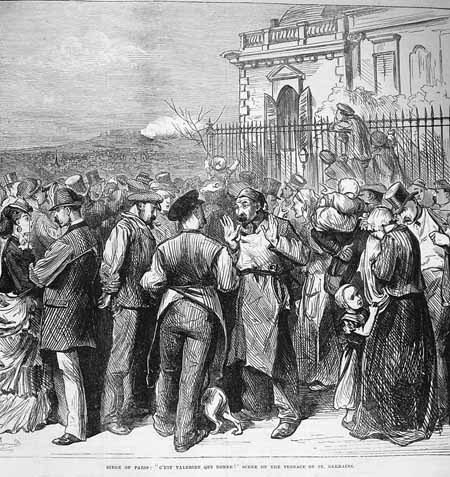On a Sunday toward the end of September Maurice was detailed to carry a message to the further end of the city, and what he witnessed along the streets he passed through filled him  with new hope. Ever since the defeat of Chatillon it had seemed to him that the courage of the people was rising to a level with the great task that lay before them. Ah! that Paris that he had known so thoughtless, so wayward, so keen in the pursuit of pleasure; he found it now quite changed, simple, earnest, cheerfully brave, ready for every sacrifice. Everyone was in uniform; there was scarce a head that was not decorated with the kepi of the National Guard. Business of every sort had come to a sudden standstill, as the hands of a watch cease to move when the mainspring snaps, and at the public meetings, among the soldiers in the guard-room, or where the crowds collected in the streets, there was but one subject of conversation, inflaming the hearts and minds of all--the determination to conquer. The contagious influence of illusion, scattered broadcast, unbalanced weaker minds; the people were tempted to acts of generous folly by the tension to which they were subjected. Already there was a taint of morbid, nervous excitability in the air, a feverish condition in which men's hopes and fears alike became distorted and exaggerated, arousing the worst passions of humanity at the slightest breath of suspicion. And Maurice was witness to a scene in the Rue des Martyrs that produced a profound impression on him, the assault made by a band of infuriated men on a house from which, at one of the upper windows, a bright light had been displayed all through the night, a signal, evidently, intended to reach the Prussians at Bellevue over the roofs of Paris. There were jealous citizens who spent all their nights on their house-tops, watching what was going on around them. The day before a poor wretch had had a narrow escape from drowning at the hands of the mob, merely because he had opened a map of the city on a bench in the Tuileries gardens and consulted it.
with new hope. Ever since the defeat of Chatillon it had seemed to him that the courage of the people was rising to a level with the great task that lay before them. Ah! that Paris that he had known so thoughtless, so wayward, so keen in the pursuit of pleasure; he found it now quite changed, simple, earnest, cheerfully brave, ready for every sacrifice. Everyone was in uniform; there was scarce a head that was not decorated with the kepi of the National Guard. Business of every sort had come to a sudden standstill, as the hands of a watch cease to move when the mainspring snaps, and at the public meetings, among the soldiers in the guard-room, or where the crowds collected in the streets, there was but one subject of conversation, inflaming the hearts and minds of all--the determination to conquer. The contagious influence of illusion, scattered broadcast, unbalanced weaker minds; the people were tempted to acts of generous folly by the tension to which they were subjected. Already there was a taint of morbid, nervous excitability in the air, a feverish condition in which men's hopes and fears alike became distorted and exaggerated, arousing the worst passions of humanity at the slightest breath of suspicion. And Maurice was witness to a scene in the Rue des Martyrs that produced a profound impression on him, the assault made by a band of infuriated men on a house from which, at one of the upper windows, a bright light had been displayed all through the night, a signal, evidently, intended to reach the Prussians at Bellevue over the roofs of Paris. There were jealous citizens who spent all their nights on their house-tops, watching what was going on around them. The day before a poor wretch had had a narrow escape from drowning at the hands of the mob, merely because he had opened a map of the city on a bench in the Tuileries gardens and consulted it.